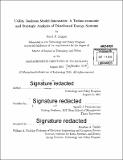| dc.contributor.advisor | Ignacio J. Pérez-Arriaga | en_US |
| dc.contributor.author | Burger, Scott P | en_US |
| dc.contributor.other | Technology and Policy Program. | en_US |
| dc.date.accessioned | 2016-07-11T14:44:06Z | |
| dc.date.available | 2016-07-11T14:44:06Z | |
| dc.date.copyright | 2015 | en_US |
| dc.date.issued | 2015 | en_US |
| dc.identifier.uri | http://hdl.handle.net/1721.1/103569 | |
| dc.description | Thesis: S.M. in Technology and Policy, Massachusetts Institute of Technology, Institute for Data, Systems, and Society, Technology and Policy Program, 2015. | en_US |
| dc.description | Cataloged from PDF version of thesis. | en_US |
| dc.description | Includes bibliographical references (pages 129-146). | en_US |
| dc.description.abstract | Bankable and sustainable utility business models are key to the secure and efficient functioning of critical electric power infrastructure. Due to a variety of factors, including technological progress and policy goals, many electric power industry stakeholders believe the business model of electric utilities is on the precipice of unprecedented change. However, calls for dramatic changes to utility business models must be backed by substantive analysis of what aspects of the business model must change, who is best suited to provide what services, and what resources should be deployed to provide these services. This thesis presents a review of current utility business models, an introduction to the agents driving changes in utility business models, and a methodology for assessing emerging business models that bridges two important but heretofore unlinked fields of business model analysis. This thesis first provides a definition of the electricity services upon which business models in the utility industry are based. These definitions are grounded in linear programming and fundamental power system economics and technology. Next, this thesis provides an ontological taxonomy of electricity services business models, and demonstrates the application of this taxonomy on demand response and solar photovoltaics business models. This ontological breakdown is extended from management and strategy literature developed over the past fifteen years in the context of emerging Internet-based businesses. This thesis then demonstrates how quantitative models can be used in combination with qualitative analyses to provide a more complete understanding of which, if any, emerging electricity services business models may prove technically and economically attractive. A case study is performed on solar PV and electricity storage business models. | en_US |
| dc.description.statementofresponsibility | by Scott P. Burger. | en_US |
| dc.format.extent | 186 pages | en_US |
| dc.language.iso | eng | en_US |
| dc.publisher | Massachusetts Institute of Technology | en_US |
| dc.rights | M.I.T. theses are protected by copyright. They may be viewed from this source for any purpose, but reproduction or distribution in any format is prohibited without written permission. See provided URL for inquiries about permission. | en_US |
| dc.rights.uri | http://dspace.mit.edu/handle/1721.1/7582 | en_US |
| dc.subject | Institute for Data, Systems, and Society. | en_US |
| dc.subject | Engineering Systems Division. | en_US |
| dc.subject | Technology and Policy Program. | en_US |
| dc.title | Utility business model innovation : a techno-economic and strategic analysis of distributed energy systems | en_US |
| dc.title.alternative | Techno-economic and strategic analysis of distributed energy systems | en_US |
| dc.type | Thesis | en_US |
| dc.description.degree | S.M. in Technology and Policy | en_US |
| dc.contributor.department | Massachusetts Institute of Technology. Engineering Systems Division | |
| dc.contributor.department | Massachusetts Institute of Technology. Institute for Data, Systems, and Society | |
| dc.contributor.department | Technology and Policy Program | |
| dc.identifier.oclc | 938935830 | en_US |
